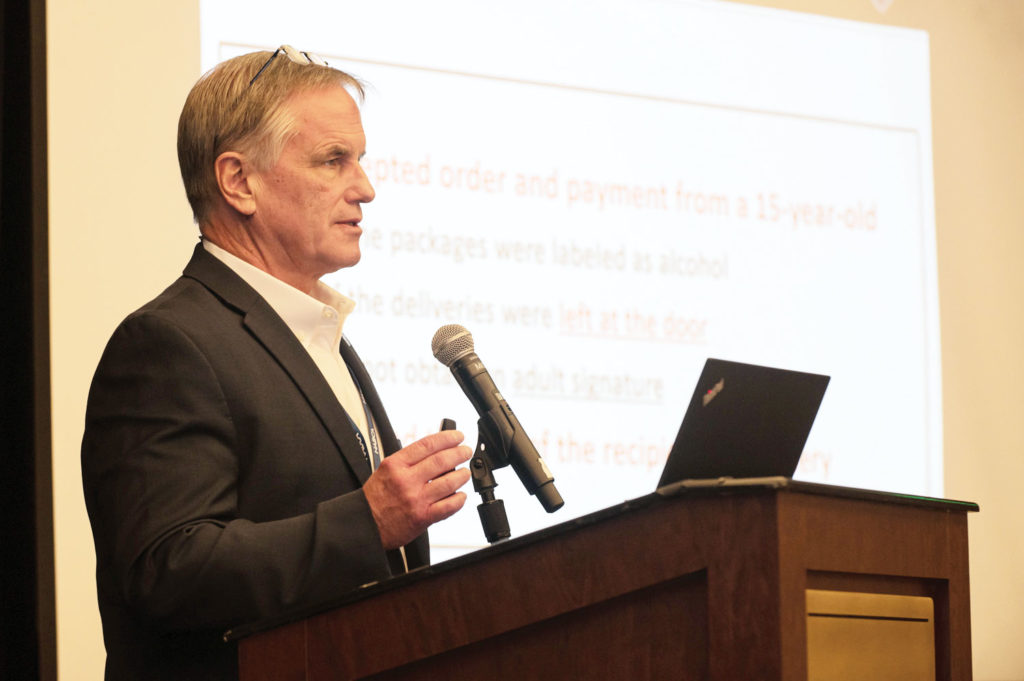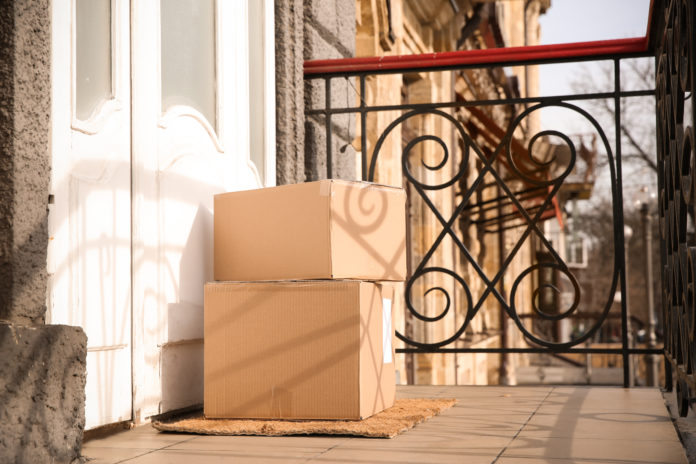Illegal alcohol shipping in the U.S. has grown into a significant and dangerous problem. Ecommerce exploded during the Covid-19 pandemic, allowing people to easily buy alcohol online from numerous platforms. As an unfortunate downside, a percentage of these purchases ship from businesses not licensed to do so, without proper regulation.
“It’s a huge, huge problem,” says Ted Mahoney, chief investigator of the Massachusetts Alcoholic Beverages Control Commission. He spoke during the panel “Flippers & Shippers — Best Practices on Thwarting the Secondary Market” at the 2022 National Alcohol Beverage Control Association (NABCA) Administrators Conference in Pittsburg this past October.
“We have a generational perfect storm today,” Mahoney continues. “We have never-before-seen levels of ecommerce, fueled by a pandemic that nobody has ever seen before. I would love to toss this into the lap of the Feds, but that’s not going to happen. And the local governments are not going to deal with it. So it’s ours to own [on the state level]. And five years from now, I don’t want the people who come after me to say, ‘Was he dumb or stupid to not see what was happening right in front of his eyes?’”
For example, legally reported shipped wine sales increased in Massachusetts from $48.7 million annually in 2019 to $66.5 million and $66.3 million in 2020 and 2021, respectively. The number of consumers in the state legally purchasing these products grew from 116,289 in 2019, to 180,860 and 169,723 in the following two years of the pandemic.
These numbers do include the illegal market, as some of these packages come from direct wine shippers operating outside the parameters of their license. Unlicensed entities also ship unreported packages, Mahoney says. To address these issues, he and his team have taken several approaches.
Startling Statistics
As in other states, Massachusetts regulators have bought product from these lawbreaking parties. “We make these purchases because we want physical evidence on our persons,” Mahoney explains. “We need to develop solid cases with solid reports.”
This includes a series of compliance checks that followed packages, and tested their originating platforms. The results were startling:
- 96% of the digital platforms accepted order and payment from a 15-year-old consumer.
- 43% of the package deliveries did not obtain an adult signature.
- 26% of these deliveries were simply left at a consumer’s door.
- 0% of delivery personnel verified the age of the recipient.
“We sat down with the main express [shipping] companies, and they were shocked, because they do have training for this,” Mahoney says. “I think we’ll get a response from this.”
Ordering alcohol from these illegal shippers has helped shed light on the layers of their criminal organizations.
One bottle bought from California listed a California hotel as the return address. Another, ordered from Florida, used the address of a promotions firm that did not have an alcohol license, and arrived without any labels indicating alcohol inside.
It gets more complicated — and international.
Global Game of Cat and Mouse
A large ecommerce platform in the U.K. operates next door to an alcohol retailer. Working together, they fill an order and ship the item overseas, with a receiving label for a New York company. But when the package arrives at JFK Airport, a nearby cargo company is paged.
The cargo company picks up the package and then affixes a new receiving label, adding the buyer’s name and address in replacement of the New York company’s address. The cargo company then brings the package to a wholesaler with a shipping license, who sends the box through UPS.
The return address listed? It’s the New York company, which switched from buyer to seller on the label without ever touching the package.
Another product purchased was fulfilled by an illegal shipping business operating out of the 7th floor of a residential apartment in New York. They took the order and dispatched it to a retailer in Kentucky. Someone from that Kentucky store traveled across state lines with the alcohol and shipped it from a UPS location in Ohio. On the shipping label, they listed the return address of the UPS store, using the shipping manager’s name.
As in other cases, all parties involved — at every level, in every state — operated without proper licenses, counting on the layers of the business to hide its illegality.

Mahoney and his team have successfully dug into these layers.
“We started asking the carriers to provide us with the true name of the shipper and the point or origin,” Mahoney says. “My team has been great at it. I tell my associates, ‘Just keep pulling it back. Keep looking deeper’.”
Unfortunately, some packages arrive in areas that investigators cannot easily access.
“Now we’re hearing that [alcohol] is being sent through university mailrooms, because nobody checks what’s going on in there,” Mahoney says.
Another circumvention technique that Massachusetts regulators have identified is bottles of wine or other higher-proof alcohol shipped in boxes falsely labeled as containing lower-ABV, ready-to- drink beverages.
Once Mahoney and his team began probing these illegal online platforms, the companies reacted by attempting to work with licensed alcohol retailers.
“They said, ‘Hey, let’s make a deal, because now we can legally ship into the state’,” Mahoney says. “But at the end of the day, you have to ask: Who’s accepting the order and payment, is it a percentage play, and is their license being illegally used elsewhere in the chain?”
“There may be a lawful way to do this,” he adds, “but what they’re doing isn’t lawful.”
To curb this unlawful behavior, Mahoney’s team sends cease-and-desist letters to all parties involved, along with notice to the common carriers.
“This is one of the most effective things we can do, because [the common carriers] will shut off the shippers in a heartbeat,” Mahoney explains. “The common carriers have been pretty good partners, especially UPS.”
An Active Approach
Massachusetts is far from the only state effectively attacking illegal shipping. In Michigan, law enforcement ramped up their efforts in the last seven years. This comes after the state fought in court against out-of-state alcohol shipping — and lost. But companies can only legally ship so much product into the state, and must have a Michigan presence to go through the state’s three-tier system.
Companies still break these laws. Typically this means shipping more product than is allowed, and/or lacking a licensed Michigan presence.
“We find out from the carriers whether the shippers are licensed or not, and then we send out cease and desist letters with info on how to comply,” says Don McGehee, division chief, Michigan department of attorney general. He spoke at the same NABCA panel as Mahoney. “If we find out that they shipped again, whether through our controlled buys or the carrier reports, then we sue them.”
Currently, Michigan has 19 active lawsuits against wineries, distilleries and breweries.
“We’ve had a lot of injunctions, a lot of fines well over $100,000,” McGehee says. After the state took these actions, the amount of illegal shipping declined 78% in the first year, he adds, and 58% in the second year.
“It’s having an effect,” McGehee says. “Are we getting them all? Of course not. But we’re making a dent in it.”
Like Massachusetts, Michigan has worked with UPS and FedEx, and also noticed similar setups behind these crimes: alleged in-state alcohol producers operating as something they are not.
“A lot of these are fulfilment centers, not actual wineries. Some are licensed and some make a few products, but not the majority of the product,” McGehee says. “Like Wine.com. Ohio also took action against them. Wine.com is trying to bypass the [three-tier] system.” When investigating these kinds of ecommerce services, he recommends a similar course of action to Mahoney.
“You need to take a deeper dive into how these out-of-state shippers are set up,” McGehee says. “Are they really manufacturers [rather than retailers]?”
A Nationwide Enforcement Effort
Another significant action taken against illegal shipping comes from the National Liquor Law Enforcement Association. This non-profit organization has formed a nationwide workgroup that confronts the problem.

“Once a month, 10 to 15 of us get together and go over all the issues involved, and talk about the suppliers, the platforms and the people involved,” Mahoney says. “We want to develop cooperation among the states. We can help other states by helping them not make the same mistakes that we made. I think this workgroup has been a major stepping stone.”
This regularly meeting workgroup is especially helpful because tackling this issue requires considerable financial and manpower resources. In Massachusetts, many of the investigators working these cases do so only part time during the week, splitting between different enforcement duties.
“The workgroup is working on many fronts to enforce and bring into compliance those that are illegally shipping and delivering alcohol,” says NLLEA Executive Director Carrie Christofes. “Workgroup initiatives have allowed states to share their investigative tools and techniques involving illegal shipping investigations which has led to a more efficient means to investigate cases that cross state lines.”
As a group, the NLLEA is continually working to:
- Educate and bring into compliance those that are illegally shipping alcohol.
- Enforce and penalize those that ignore cease and desist requests to stop illegal shipping of alcohol.
- Bring awareness to lawmakers on the increased efforts involved in investigating illegal shipping and loss of tax revenue for states for prevention and public health programming.
- Highlight public health concerns of alcohol being delivered to those under the age of 21 through compliance initiatives.
Operating with Limited Resources
Michigan recently received additional state funding, and still only counts a handful of dedicated agents.
“Five to six years ago we got funding for an illegal shipping team,” McGehee says. “That certainly helps, because a lot of states do not have those resources. It’s a difficult task.”
And it’s a task upon which may depend the future of public safety and economic stability regarding the alcohol industry. Mahoney urges investigators to stress this fact when seeking state resources and legal authorizations.
“In terms of getting affidavits and more action from the legal side,” he says, “we’ve had success when we’ve pointed out our need to take enforcement action to protect our tax-paying businesses and our public safety.”
The Middle Tier Responds
A large part of what helps protect public safety in the alcohol industry is the middle tier. Circumventing wholesalers and distributors through illegal shipping is a danger for consumers, argues representatives from Wine & Spirits Wholesalers of America.
“WSWA is against the shipping of alcohol to consumers,” says Jo Moak, senior vice president and general counsel for WSWA. “It presents a lot of challenges. It’s hidden, not transparent. Regulators cannot see the products or what is happening with them. This creates problems with public health and safety. Underage access is still a huge issue with shipping. It promotes the sale of counterfeit products. And unregulated sales mean lost taxes.”
“It creates an uneven playing field,” she adds. “Everything that the three-tier system upholds, shipping undermines a lot of that.”
WSWA sees the same issues in stopping shipping as the state regulators largely tasked with the effort.
“Unfortunately, it’s a game of Whac-A-Mole,” Moak says. “The tools to stop it require a lot of resources, a lot of time and a lot of manpower. Unfortunately, there’s no easy way.”

WSWA (which has an investment in Drizly) stresses the difference between shipping and local delivery services.
“Localized licensed delivery is okay, because the states are well equipped to regulate that,” Moak says. “That is business that helps the community. That system is highly successful.”
“We can be confident in the structure of the local licensed delivery system,” adds Jake Hegeman, WSWA assistant general counsel, legal and regulatory. “There’s predictability to it. It’s much more challenging when products are flowing across state lines. There’s too many levels of unpredictability in that.”
Including the loss of taxes at the retail level.
“That’s one element of the unlevel competitive landscape,” Hegeman says, “illegally shipped products without proper taxes paid versus someone who has paid for the proper license and taxes. This is where the fairness question sets in. Someone shipping without paying taxes, that brings up fundamental questions about whether this is a marketplace of fairness; a marketplace of parity.”
Circumnavigating beverage alcohol retailers presents another batch of public safety hazards.
“If you’re a licensed retailer, you’re paying rent or own your building, you care about your community and you know your customers by name,” says Michael Bilello, WSWA senior vice president for communications and marketing. “You’re not going to sell underage kids alcohol because you know their parents, you know their family and you know they’re underage kids.”
Same logic goes for local bars and restaurants.
“Think about the TIPS training that bartenders go through,” Bilello says. “That bartender is held accountable if someone is intoxicated. If someone is intoxicated and stumbles into a retail store, store employees are not going to sell that person product.”
“But when you have a box sent to a doorstep, someone is not there to ascertain the totality of the situation,” he adds. “Minimizing contact with consumers could create unintended consequences. There’s billions put into all these public safety measures in the alcohol industry, and all of that is upended by out-of-state direct-to-consumer shipping.”
Kyle Swartz is editor of Beverage Dynamics. Reach him at kswartz@epgmediallc.com. Read his recent piece, The Alcohol Brands Driving Meaningful Change in DEI.







Maybe we should all take a look at the ridiculous web of self-imposed laws we’ve put in place here under the guise of ‘consumer protection’. Anyone being honest about this would admit the consumer protection component is at the bottom of the list of importance…it’s just a great platform to use to instill fear in people’s minds.
It’s REALLY all about tax revenue and protecting the very large interests of the middle-men in the three tier system who could otherwise see some of their business erode to direct-to-consumer sales like we’ve seen in many other industries. (In those industries, the smart ‘middlemen’ have come in from their golf courses and reinvented their businesses to continue to thrive…would love to see the alcohol distributors stop whining and lobbying to keep the industry from evolving, but rather take it by the horns and reinvent themselves to remain relevant in changing times).
Instead of playing the whack-a-mole game, if we put this much energy into evaluating the layers upon layers of self-imposed regulations and made things easier, while layering on SIMPLE rules for tax collection/remittance and guidlines for preventing minors from transacting, I’d be willing to bet that states would see a huge increase in tax revenues while spending much less money on enforcement.
But why should distributors and a three tier system control which wines I can enjoy? Why can’t I support a small producer in Vermont, Virginia, or New Mexico? The big guys ( Constellation, Diageo, Gallo, etc) will continue to keep the coffers of distributors (and thereby the state and through taxes) full. This is an attack on small businesses, and a money grab. Lame.
I love how the article is written as if this is a huge public safety concern. The real interest is lost State tax revenue and ineffective and inefficient wholesalers being left out of “their cut”.
Illicit and sometimes legal drug traffic is a much greater public health problem than alcohol bypassing the three-tier system.
Let’s be honest about this “problem”.
Those of us who hold direct shipping permits and are shipping wine legally have the same issues with the common carriers – they drop wine on the porch (illegal), do not get a signature of someone over the age of 21 (illegal) even though ALL of our packages are labeled as alcohol requiring an adult signature. And to make it worse, WE are held accountable for that. There is no discourse for them breaking the law. It not only causes problems for us, but for the consumer as well when they get angry with us for requiring a signature for the wine when half the time it is just dropped off by UPS/Fedex.
Manufacturing a problem that doesn’t exist. Minors aren’t ordering wine and high proof liquor online. Why? Too expensive. Minors are looking for cheap beer and spirits. There is no crisis here of underage drinking. Only a crisis of protecting tax revenue of the 3-tiered distribution system.
Where can I found the data from Massachusetts? I’m really interested in sharing it with my association.